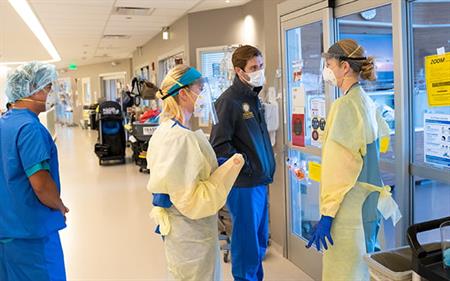
Lucila Ohno-Machado, M.D., Ph.D.
AIMBE College of Fellows Class of 2007 For outstanding and creative contributions to practical and fundamental medical informatics.
Introducing COVID19questions.org
Via UC San Diego Health | September 17, 2020 As the COVID-19 pandemic continues, there is an urgent need to determine who is at greatest risk for severe disease, better understand how the disease and treatments evolve, and predict the need for resources. But to get there, researchers and clinicians need more data about what patients have experienced so far, and what factors are associated with different patient outcomes.
As the COVID-19 pandemic continues, there is an urgent need to determine who is at greatest risk for severe disease, better understand how the disease and treatments evolve, and predict the need for resources. But to get there, researchers and clinicians need more data about what patients have experienced so far, and what factors are associated with different patient outcomes.
To provide this information, a new research consortium invites clinicians, researchers, patients and the general public to submit questions that could be answered by COVID-19 patient record data from more than 200 participating hospitals. Questions are submitted and answers are provided via a new web portal: COVID19questions.org.
The consortium, called Reliable Response Data Discovery (R2D2), is led by Lucila Ohno-Machado, MD, PhD, chair of the Department of Biomedical Informatics at UC San Diego Health, and made possible by seed funding from the Gordon and Betty Moore Foundation. R2D2 comprises 12 health systems (202 hospitals) to date: UC San Diego Health, Cedars Sinai Medical Center, Ludwig Maximilian University of Munich, San Mateo Medical Center, UC Davis Health, UC Irvine, UCLA, UCSF, University of Colorado Anschutz Medical Campus, University of Southern California, University of Texas Health Science Center at Houston and Memorial Hermann Health System, and the Veterans Affairs (VA) Healthcare System… Continue reading.
Most Patients Willing to Share Medical Records for Research Purposes
Via UC San Diego Health | August 21, 2019As medicine becomes both bigger and more personalized, the need for massive databases of patient records, such as the 1 million person All of Us Research Program , become increasingly essential to fueling both new discoveries and translational treatments.
But the looming, lingering question is to what degree are individual patients willing to share medical records and biospecimens with researchers and institutions beyond their personal physician or health care system? And more specifically, how should patients be asked and what information are they most likely to share?
In a novel attempt to answer these questions, researchers at University of California San Diego School of Medicine, with collaborators in California, North Carolina and Texas, asked patients at two academic hospitals to respond to a variety of different approaches seeking to share their medical data with other researchers… Continue reading.
Big Data Sharing for Better Health
Via UC San Diego News Center | October 10, 2014Researchers at University of California, San Diego School of Medicine have been awarded a $9.2 million grant to help modernize and transform how researchers share, use, find and cite biomedical datasets.
The 3-year project, in collaboration with The University of Texas Health Science Center at Houston, is part of a federal initiative to increase the utility of biomedical research data, launched this week by the National Institutes of Health (NIH) through its Big Data to Knowledge (BD2K) program.
The agency plans to invest nearly $656 million through 2020 to encourage biomedical data sharing and re-use, accelerating the pace of new medical discoveries at lower cost to U.S. citizens who fund basic research.
“Data creation in today’s research is exponentially more rapid than anything we anticipated even a decade ago,” said NIH Director Francis S. Collins, MD, PhD. “Mammoth data sets are emerging at an accelerated pace in today’s biomedical research and these funds will help us overcome the obstacles to maximizing their utility. The potential of these data, when used effectively, is quite astounding.”
Data sharing and the ability to include multiple “big data” datasets in research studies could help scientists find patterns among diseases, genes and lifestyle that might easily go unnoticed in smaller datasets. These patterns could have virtually endless applications in advancing health, for example, by helping to identify those at higher risk for breast cancer, heart attack or other diseases and conditions. Researchers might also more rapidly identify rare side effects of certain medications or the benefits of new drugs to small subsets of individuals.
As part of this vision, the UC San Diego-led team will develop a strategy for cataloging and indexing biomedical datasets, coined “big data” because of the volume, variety and speed at which information – anything from whole genome sequencing to social media tweets – are being collected in the digital era.
Dataset indexing is considered a vital step toward being able to build a searchable online digital library, much like the highly successful online PubMed directory, but for health-related datasets.
“You can’t go online right now and search for datasets on, say, a particular type of brain tumor,” said Lucila Ohno-Machado, MD, PhD, professor of medicine and lead investigator on the Biomedical and healthCAre Data Discovery and Indexing Ecosystem (BioCADDIE). “These specialized search engines don’t exist. We are starting almost from scratch. I think this might surprise people.”
 AIMBE
AIMBE
